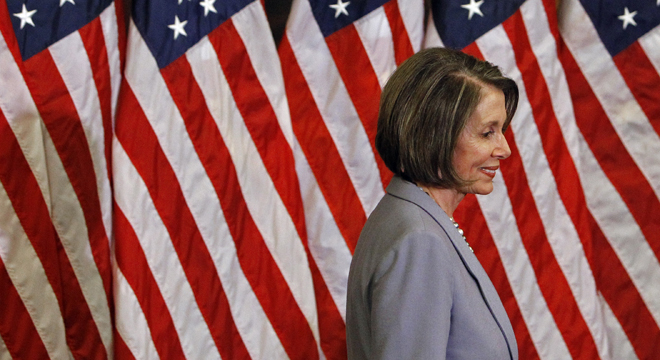After a two-hour meeting Wednesday in the Capitol basement, House Republicans were no closer to an immigration reform consensus other than that they don’t like the Senate bill, they don’t like big bills, and they don’t like a “pathway to citizenship” — if not the policy, then at least the term.
The summary statement from House GOP leaders released after the meeting betrays some of those internal divisions, and underscores the difficulty reformers will face getting the elements of a comprehensive bill through the House, let alone to a negotiated agreement with the Senate.
But if there’s a way to get there, the public will actually get clearer instructions from House Minority Leader Nancy Pelosi than anyone in the GOP.
In a wide-ranging sit-down interview with TPM on Wednesday, Pelosi described her own bright lines and areas of flexibility — her procedural dos and don’ts and her policy limits — which ironically are the parameters that matter most when evaluating whether a bill is possible.
“We’ve always been saying — I talked to the Speaker about it — ‘However you want to bring it to the floor, bring it to the floor, but understand how it leaves the floor has to be in a comprehensive form to go to conference. But if you want individual votes on different sections I think that’s an OK way to go.’ As long as the pieces are there. Not just the things that we’ve seen come out of that caucus.”
Her comments — and the fact that she’s privately directed them at Speaker John Boehner — reflect the extent to which she shares control over immigration reform in the House.
Thus, the question hanging over the House now is whether a majority of Republicans will support piecemeal legislation that legalizes and eventually results in citizenship for 11 million immigrants currently living in the U.S. illegally. For some it’s a non-starter. But for others the main objection is rhetorical: It’s ok to create a citizenship path, so long as it’s windy and you don’t call it that.
Pelosi is open to allowing Republicans to engage in this kind of sleight of hand — perhaps even to negotiating the terms of the path with them — so long as the ultimate policy doesn’t specifically foreclose on the possibility that current immigrants can eventually become citizens.
“I want 11 million people on a path to permanent legal status to lead to citizenship,” she said. “Permanent legal residency is a path to citizenship. This isn’t two separate things. … For our country, who are we as a country, if we say we have second-class Americans — it’s not even second-class citizens, because they’re not citizens, second-class Americans. So I think you can say a path to permanent legal status. But eventually after a certain period of time those people are eligible for citizenship. So it’s just a question of sequencing.”
The divisions over this question in Boehner’s conference are obvious. On Wednesday evening, after the GOP meeting, Rep. Mo Brooks (R-AL) declared he would oppose GOP leadership, including on mundane procedural steps on which members are expected to fall into line, if they move any legislation that “rewards” anyone who broke the law with citizenship.
Rep. Michael Grimm (R-NY), by contrast, said he supports legalization, and acknowledged to a small group of reporters that “obviously legalization leads to citizenship eventually.”
Even among those who support legalization, Republicans differ over whether the legal status should be automatic or “triggered” by some to-be-determined border security metrics, and if so, whether immigrants would be subject to deportation in the interregnum.
More to the point, it’s unclear if Boehner has the votes to pass all of these piecemeal bills in compliance with the Hastert rule.
“The bills that have come out of committee have come out strictly party-line,” Pelosi said. “There has been no attempt at bipartisanship on the part of Republicans who run the show. So those bills are totally unacceptable. Would one or the other one of them as part of a comprehensive immigration reform be acceptable in order to move the package forward? Well that remains to be seen. … I don’t have an objection to piecemeal as long as there’s an understanding that it has to be comprehensive in terms of what goes forward to the conference. So anyway the Speaker thinks he can get a bill passed, that’s okay with me. But don’t think that we’re going to give votes to all this bad stuff and call that a bill.”
In other words, Democrats won’t provide votes for draconian security measures if they don’t know for sure that they’ll eventually be merged with legalization provisions and other Democratic priorities. So if Boehner wants to move on the conservative stuff first, he’ll be on his own. And since many Republicans will oppose any immigration-related bill in order to block the House from going to conference with the Senate, there’s reason to suspect the piecemeal bills (or at least some of them) will fail anyhow.
GOP leaders must understand this, or they wouldn’t be trying to blame her for their failure preemptively.
“[T]hat’s just their usual unprofessional way — their usual amateur hour, blame it on somebody else, because they can’t legislate,” Pelosi said.
But if things reach that point anyhow, she has a polite suggestion. “The Constitution says a majority. It doesn’t say the Hastert rule, or sometimes the Hastert rule, or when I feel like it the Hastert rule. It says the majority. And there are ways to achieve the majority that I hope they will pursue.”






